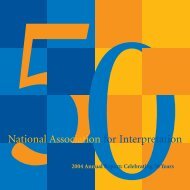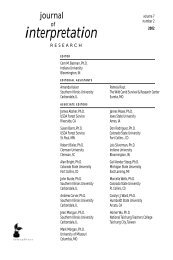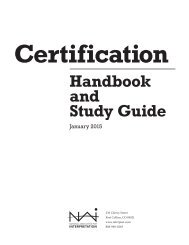interpretation
Volume 15, Number 1 - National Association for Interpretation
Volume 15, Number 1 - National Association for Interpretation
Create successful ePaper yourself
Turn your PDF publications into a flip-book with our unique Google optimized e-Paper software.
e. k i m m a c k l i n , g l e n t. h v e n e g a a r d , p a u l e. j o h n s o n<br />
In terms of the most important thing they learned, children provided 63 responses,<br />
of which 51% were about natural history (e.g., ecosystems, mountain formation), 16%<br />
about individual development (e.g., having fun), 10% about group dynamics (e.g.,<br />
teamwork), 10% about management and conservation (e.g., harming plants or animals),<br />
and 8% about safety (e.g., bears).<br />
Finally, in terms of questions for the park, children provided 49 responses,<br />
of which 37% were about natural history (e.g., mountains, wildlife), 29% about<br />
management issues (e.g., bears, fires), 16% about future interpretive events (e.g.,<br />
child-focused programs), 12% about safety (e.g., bears, getting lost), and 6% about<br />
miscellaneous details.<br />
Discussion<br />
This study examined children’s enjoyment and perceived learning from an<br />
improvisation-dominated interpretive program. Children generally enjoyed the<br />
entire program, but especially the improvisation activities because they offered fun,<br />
physical activity, creativity, challenges, positive group dynamics, and novelty. These<br />
characteristics are consistent with other analyses of <strong>interpretation</strong> for children (Cessford,<br />
1989; Hansen-Møller & Taylor, 1991; Beck & Cable, 2002). Enjoyment may have resulted<br />
from healthy social interactions, group energy, and a sense of accomplishment (Spolin,<br />
1983; Beck & Cable, 2002; Caine et al., 2005). Some activities were enjoyed less because<br />
of difficult logistics or an incorrect matching of challenge and ability.<br />
In terms of perceived learning, the activities rated highest by children were not<br />
improvisation games, but a traditional nature walk and interpretive talk. These activities<br />
involved sensory awareness, physical involvement, and guided interaction. According<br />
to the interpreters, children seemed to learn well from activities in which there was<br />
effective collaboration with peers (e.g., Pictionary), interaction with the interpreters, and<br />
simple messages (see Singer & Revenson, 1996; Vasta et al., 2004). For example, animals<br />
and plants on the nature walk stimulated many questions about ecology and human<br />
impact, resulting in discussions about proper behavior that minimizes impacts on the<br />
environment and ensures the safety of people and wild animals. The activities rated low<br />
for perceived learning primarily focused on increasing group cohesion and energy levels,<br />
and did not have specific learning goals.<br />
In terms of specific perceived learning topics, children most often mentioned<br />
concepts of natural history, which is consistent with most parks’ interpretive goals<br />
(e.g., understand the natural environment, maintain ecological integrity, and increase<br />
meaningful visitor experiences) (Tilden, 1977; Cessford, 1989; Beck & Cable, 2004).<br />
Park managers would also be pleased to know that children learned about management,<br />
conservation, and safety issues (Government of Canada, 2007).<br />
Other researchers promote the use of thematic <strong>interpretation</strong>, which increases<br />
children’s ability to recall and apply information (Tarlton & Ward, 2006). However,<br />
<strong>interpretation</strong> involving improvisation has less thematic structure; nevertheless,<br />
children in our study stated that they learned information relevant to the park and to<br />
their experiences. Furthermore, children wanted to learn more about natural history<br />
concepts, park management, and future interpretive events.<br />
10 j o u r n a l o f i n t e r p r e t a t i o n r e s e a r c h












